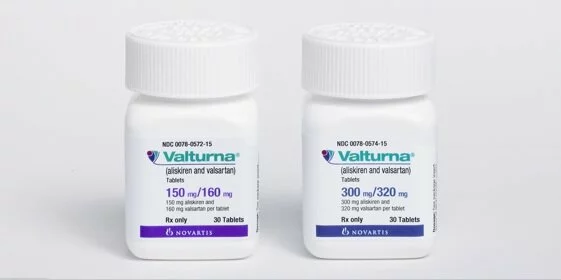
A new blood-pressure treatment has come on the market that is of potential interest to hypertension patients whose blood pressure is not being adequately controlled with monotherapy.
Last month, the US Food and Drug Administration (FDA) approved Novartis’ Valturna (aliskiren and valsartan), which combines in a single pill valsartan, the active ingredient in Diovan — the top-selling branded high blood pressure medicine — and aliskiren, the active ingredient in Tekturna — the only approved direct renin inhibitor (DRI).
Valturna is the first and only medicine to target two key points within the renin system, an important regulator of blood pressure. It is suitable for patients whose high blood pressure has not been adequately controlled on aliskiren alone, or by an angiotensin receptor blocker, such as Diovan, alone. It could also be considered as an initial treatment for patients who are likely to need multiple drugs to achieve their blood pressure goals.
Valturna targets the renin angiotensin aldosterone system (RAAS) in two ways. The valsartan component blocks, at the receptor level, the action of angiotensin II, which causes blood vessels to tighten and narrow. The aliskiren component directly inhibits renin, an enzyme produced by the kidneys that starts a process that leads to formation of angiotensin II. This helps blood vessels relax and open.
Because Valturna combines two different types of blood pressure drug, it offers greater blood pressure reduction than either drug would alone. It also seems conceivable having both medications available in one pill would help consumers with drug costs and insurance coverage.
Cautions: Women of child-bearing age should be particularly careful with this medicine. AVOID USE IN PREGNANCY. Do not take if you are breastfeeding or if you are planning to become pregnant. If pregnancy is detected, discontinue Valturna as soon as possible. This is because drugs that act on the renin system can cause injury and death to the unborn baby. Other serious reactions to be aware of when taking Valturna are a risk of head and neck angioedema (a rapid swelling of the flesh), and hypotension (low blood pressure). If either of these are suspected, call your physican immediately. Side effects of Valturna are the same as those of its two component medications, valsartan and aliskiren. Patients may experience tiredness, sore throat, runny nose, diarrhea, upper respiratory tract infection, urinary tract infection, flu, or dizziness. Consult your doctor before taking this or any other medication.
-
-
Search Blog Posts
-
Save Even More Money!
-

-
Trending Content
-
Watch our YouTube Video
-
Categories
Big Pharma Buy prescriptions online Canadian drugs Drug costs Drug reimportation Drug safety eDrugSearch.com FDA Health 2.0 Healthcare100 Healthcare blogs Healthcare solutions Low-cost drugs Medicare Part D Merck Online pharmacies Online pharmacy safety Pfizer Pharma bloggers Pharmaceutical companies Pharmaceutical marketing Pharma cheerleaders Prescription drug abuse Prescription drug prices Prescription drugs Prescriptions Wal-Mart drug plan -
Blogroll
- Bullet Wisdom
- Bulverde Business Directory
- Christian Counseling San Antonio Tx.
- Christian Schools in San Antonio Texas
- Christian Social Network
- Christians United for Israel
- DrugWonks.com
- Eye on FDA
- GoozNews
- Health 2.0
- Hunting Forum
- In the Pipeline
- Jesus Christ Our King
- John Hagee Ministries
- Kevin, M.D.
- Local Search Marketing
- My $299 Website
- Pharm Aid
- Pharma Marketing
- PharmaGossip
- Pharmalot
- San Antonio Asphalt
- San Antonio Life Insurance
- San Antonio Pressure Washing
- Storage New Braunfels Tx
- Texas Wildlife Supply
- The Angry Pharmacist
- The Health Care Blog
- The Peter Rost Blog
- World Vision
-
Tags
big pharma Canadian drugs canadian pharmacies canadian pharmacy consumer reports craig newmark divine healing Drug costs drug prices Drug reimportation eDrugSearch.com FDA Fosamax Generic drugs healing scriptures Health 2.0 healthcare reform Hypertension Jehova Rophe Jesus Christ Lipitor Metformin miracles nabp online pharmacy dictionary online prescriptions osteoporosis peter rost Pharmacies pharmacists pharmacychecker pharmacy spam phrma Prescription drugs prescription medication Proverbs 3:5-8 reimportation relenza Roche saving money SSRI swine flu Tamiflu The Great Physician The Lord our Healer -
Recent Tweets
- eDrugSearch Blog Rank on the Healthcare100: http://t.co/VJprL4LZWl [#]
- New blog posting, How to Get Prescription Medication Without Health Insurance - http://t.co/1ZdLavB87d [#]
- 10 Tips for Safer Prescription Drug Use http://t.co/GFnMIN1mCy [#]
- New blog posting, How to Beat High Drug Prices By Comparing Low Cost Pharmacies - http://t.co/fsZ0stNZme [#]
-
Archives
-
Recent Comments
- Heather Sturges on What is the Difference Between Effexor and Cymbalta?
- Lupe Machol on Cost of diabetes drugs has nearly doubled
- Manpower For Hospital In Pune on Why is Medicine Cheaper in Canada?
- Jen on How a Canadian Pharmacy Can Help You Offset Drug Price Hikes
- nino iarajuli on Vending machine dispenses prescription drugs